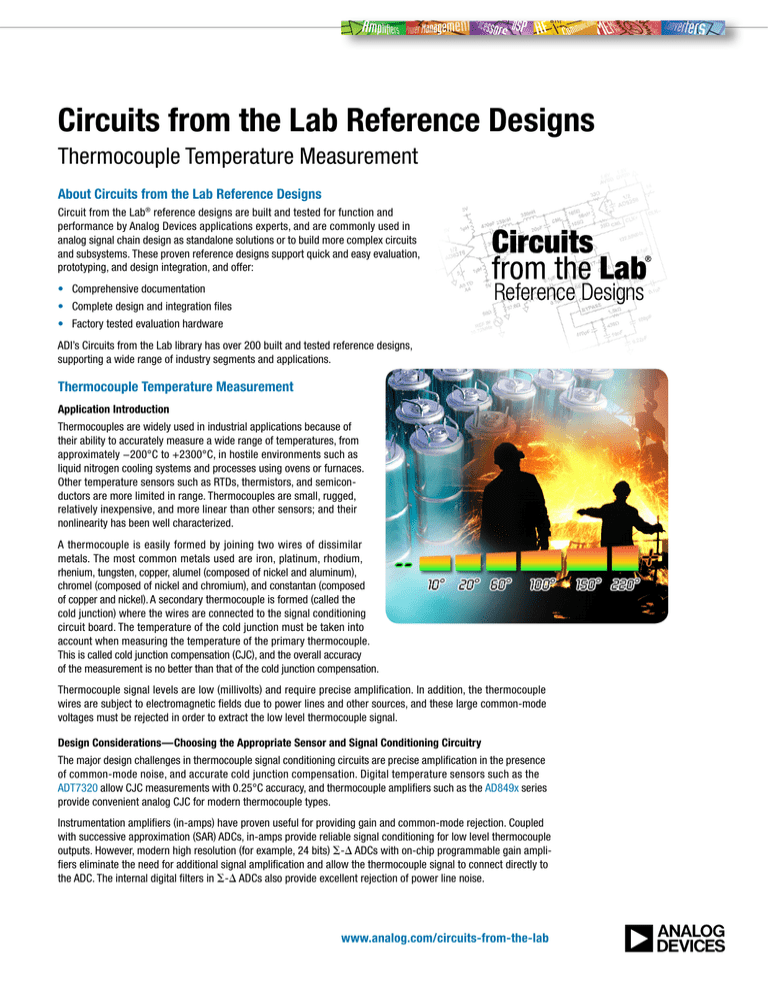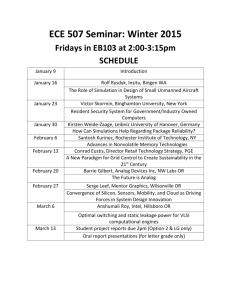
Circuits from the Lab Reference Designs
Thermocouple Temperature Measurement
About Circuits from the Lab Reference Designs
Circuit from the Lab® reference designs are built and tested for function and
performance by Analog Devices applications experts, and are commonly used in
analog signal chain design as standalone solutions or to build more complex circuits
and subsystems. These proven reference designs support quick and easy evaluation,
prototyping, and design integration, and offer:
• Comprehensive documentation
• Complete design and integration files
• Factory tested evaluation hardware
ADI’s Circuits from the Lab library has over 200 built and tested reference designs,
supporting a wide range of industry segments and applications.
Thermocouple Temperature Measurement
Application Introduction
Thermocouples are widely used in industrial applications because of
their ability to accurately measure a wide range of temperatures, from
approximately −200°C to +2300°C, in hostile environments such as
liquid nitrogen cooling systems and processes using ovens or furnaces.
Other temperature sensors such as RTDs, thermistors, and semiconductors are more limited in range. Thermocouples are small, rugged,
relatively inexpensive, and more linear than other sensors; and their
nonlinearity has been well characterized.
A thermocouple is easily formed by joining two wires of dissimilar
metals. The most common metals used are iron, platinum, rhodium,
rhenium, tungsten, copper, alumel (composed of nickel and aluminum),
chromel (composed of nickel and chromium), and constantan (composed
of copper and nickel). A secondary thermocouple is formed (called the
cold junction) where the wires are connected to the signal conditioning
circuit board. The temperature of the cold junction must be taken into
account when measuring the temperature of the primary thermocouple.
This is called cold junction compensation (CJC), and the overall accuracy
of the measurement is no better than that of the cold junction compensation.
Thermocouple signal levels are low (millivolts) and require precise amplification. In addition, the thermocouple
wires are subject to electromagnetic fields due to power lines and other sources, and these large common-mode
voltages must be rejected in order to extract the low level thermocouple signal.
Design Considerations — Choosing the Appropriate Sensor and Signal Conditioning Circuitry
The major design challenges in thermocouple signal conditioning circuits are precise amplification in the presence
of common-mode noise, and accurate cold junction compensation. Digital temperature sensors such as the
ADT7320 allow CJC measurements with 0.25°C accuracy, and thermocouple amplifiers such as the AD849x series
provide convenient analog CJC for modern thermocouple types.
Instrumentation amplifiers (in-amps) have proven useful for providing gain and common-mode rejection. Coupled
with successive approximation (SAR) ADCs, in-amps provide reliable signal conditioning for low level thermocouple
outputs. However, modern high resolution (for example, 24 bits) Σ-∆ ADCs with on-chip programmable gain amplifiers eliminate the need for additional signal amplification and allow the thermocouple signal to connect directly to
the ADC. The internal digital filters in Σ-∆ ADCs also provide excellent rejection of power line noise.
www.analog.com/circuits-from-the-lab
Many Σ-∆ ADCs can provide excitation current for the RTD used in the CJC, and the multichannel or multiplexed input structure allows conversion of the
RTD voltage so that compensation can be performed digitally. Precision analog microcontrollers with on-chip Σ-∆ ADCs provide the ability to linearize the
thermocouple transfer function and thereby offer a complete smart sensing solution.
In addition to the choice of sensor and signal conditioning components selected for the final design, achieving required performance levels depends on
giving careful attention to layout, grounding, and decoupling techniques. All Circuits from the Lab reference designs have a complete set of downloadable
documentation including schematics, PCB layouts, Gerber files, and bill of materials to help guide the design engineer during the system design phase.
The “Learn More” section of each circuit note contains additional useful references including application notes, tutorials, and technical articles. Hardware
is available for purchase to evaluate circuit performance, prototyping, and/or design integration. Circuits from the Lab reference designs provide a costeffective tool in achieving optimum designs with minimal risk.
Thermocouple Temperature Measurement
Circuits from the Lab Reference Designs
Reference Design
CN0319: 14-Bit, 4–20 mA, Loop-Powered, Thermocouple
Temperature Measurement System Using ARM ® Cortex-M3 ®
CN0300: 12-Bit, 4–20 mA Loop-Powered Thermocouple
Measurement System Using ARM Cortex-M3
CN0221: USB-Based, Thermocouple Temperature
Measurement System Using ARM Cortex-M3
CN0214: USB-Based Thermocouple Temperature
Measurement System Using ARM7
CN0206: Thermocouple Temperature Measurement
System with Less Than 500 μA Current Drain
CN0172: 3-Channel Thermocouple Temperature
Measurement System with 0.25°C Accuracy
CN0287: Isolated 4-Channel, Thermocouple/RTD
Temperature Measurement System with 0.5°C Accuracy
CN0271: Thermocouple Temperature Measurement
System with Amplifier-Based Cold Junction Compensation
Cold Junction
Compensation
Circuit Output
RTD
4 mA to 20 mA
RTD
4 mA to 20 mA
RTD
USB
RTD
USB
Thermistor
Digital
Digital temperature
sensor
Digital temperature
sensor
Thermocouple
amplifier
Evaluation
Hardware
Pricing
(Ea)
EVAL-CN0319-EB1Z
$119.00
EVAL-CN0300-EB1Z
$119.00
EVAL-CN0221-EB1Z
$65.00
EVAL-ADUC7061MKZ
$25.00
SPI from ADC
EVAL-CN0206-SDPZ*
$60.00
Digital
SPI from ADC
EVAL-CN0172-SDPZ*
$160.00
Digital
SPI from ADC
EVAL-CN0287-EB1Z*
$99.00
Digital
SPI from ADC
EVAL-CN0271-SDPZ*
$80.00
Digital Format
Isolated
ARM Cortex-M3,
integrated ADC/DAC
ARM Cortex-M3,
integrated ADC/DAC
ARM Cortex-M3,
integrated ADC/DAC
ARM7, Integrated
ADC/DAC
•
*This reference design also requires EVAL-SDP-CB1Z ($99.00) and EVAL-CFTL-6V-PWRZ ($16.60).
Highlighted Circuits from the Lab Reference Designs
3.3V
ADP1720-3.3
BEAD
OUT
1.6𝛀
10𝛍F
10𝛍F
3.3V
0.1𝛍F
IN
4V TO 28V
10𝛍F
GND
CN0319: ADuCM360 Controlling 4 mA to 20 mA LoopBased Temperature Monitor Circuit. (Simplified Schematic:
All Connections and Decoupling Not Shown)
0.1𝛍F
ADR3412
IOVDD
AVDD
IEXC
RTD
VREF = 1.2V
10𝛀
AIN0
0.01𝛍F
R1
100k𝛀
ADuCM360
10𝛀
AIN1
0.01𝛍F
VREF+
RREF
5.62k𝛀
(0.1%)
PWM
VREF–
10k𝛀
THERMOCOUPLE
JUNCTION
OPTIONAL
DAC
AIN2
DVDD
47k𝛀
47k𝛀
VIN
0.1𝛍F
0.1𝛍F
VR12
VLOOP+
OP193
BC548
10k𝛀
DGND
10nF
RLOOP
47.5𝛀
VRLOOP
10k𝛀
AIN3
VLOOP–
R2
100k𝛀
10nF
AIN7
AGND
+5V
+5V
ADR441
VIN
VOUT
GND
1M𝛀
+5V
1.0𝛍F
10𝛍F
10k𝛀
SENSE
IN-AMP
OUT
INP 10k𝛀
+2.5V 10k𝛀
REF
VDD
CN0271: K-Type Thermocouple Measurement System
with Integrated Cold Junction Compensation (Simplified
Schematic: All Connections Not Shown)
0.1𝛍F
AD8476
+OUT
49.9k𝛀
10k𝛀
–VS
–VS
| Circuits from the Lab Reference Designs
2
VDD
REFIN
INTERNAL
CLOCK
0.01𝛍F
–OUT
INN
AD8495
0.01𝛍F
0.1𝛍F
+VS
COLD
JUNCTION
COMPENSATION
100𝛀
+2.5V
+5V
10𝛍F
+VS
0.01𝛍F
100𝛀
THERMOCOUPLE
0.1𝛍F
+2.5V
100𝛀
100𝛀
1.0𝛍F
16-BIT
ADC
BUF
DIGITAL
PGA
0.01𝛍F
GND
GND
AD7790
SERIAL
INTERFACE
Key Products
Temperature Sensors
Part Number
25°C Temperature Error (°C)
Output
Temperature Range (°C)
Supply Voltage Range (V)
Package
1
0.25
0.4
Analog, 5 mV/°C
SPI, 16-bits
SPI, 16-bits
−40 to +125
−40 to +150
−55 to +150
2.7 to 36
2.7 to 5.5
2.7 to 5.5
MSOP
LFCSP
SOIC
AD8495
ADT7320
ADT7310
Analog Microcontrollers with ARM Cortex-M3 Processor
Part Number
ADuCM361
ADuCM360
MCU Speed
(MIPS)
20
20
Flash (kB)
SRAM (kB)
128
128
8
8
GPIO
Pins
19
19
ADC Resolution (Bits)
24
24
ADCs per
Package
2
1
Throughput Rate
Other Features
Package
3.5 Hz to 3.906 kHz
3.5 Hz to 3.906 kHz
16-bit PWM, 12-bit DAC
16-bit PWM, 12-bit DAC
48-lead LFCSP
48-lead LFCSP
Throughput Rate
Other Features
Package
4 Hz to 8 kHz
16-bit PWM, 14-bit DAC
4 Hz to 8 kHz
16-bit PWM, 14-bit DAC
32-lead LFCSP
48-lead LQFP,
48-lead LFCSP
Analog Microcontrollers with ARM7TDMI® Processor
ADuC7061
MCU Speed
(MIPS)
10
ADuC7060
10
Part Number
32
SRAM
(Bytes)
4096
GPIO
Pins
8
32
4096
14
Flash (kB)
24
ADCs per
Package
2
24
2
ADC Resolution (Bits)
Analog-to-Digital Converters
Part Number
Resolution (Bits)
Number of Channels
Architecture
Throughput Rate
Package
24
16
24
4
1
3
Σ-∆
Σ-∆
Σ-∆
4.7 Hz to 4.8 kHz
9.5 Hz to 120 Hz
4.17 Hz to 470 Hz
TSSOP, LFCSP
MSOP
TSSOP
AD7193
AD7790
AD7793
Differential Amplifier (ADC Driver)
Small Signal
Bandwidth (MHz)
5
Part Number
AD8476
Gain
Slew Rate (V/𝛍s)
VOS (𝛍V Typ)
1
10
200
Min Pos
VSUPPLY (V)
3
Max Pos
Supply (V)
18
Supply Current
(𝛍V)
300
Amplifiers per
Package
1
Package
MSOP, LFCSP
Operational Amplifiers
Small Signal
Bandwidth (kHz)
400
35
Part Number
AD8603
OP193
Slew Rate
(Typ)
0.1 V/µs
15 mV/µs
Amps per
Package
1
1
VOS (𝛍V Typ)
12
150
Min VSUPPLY
Span (V)
1.8
1.7
Max VSUPPLY
Span (V)
6
36
Supply Current per
Amplifier (𝛍A)
60
15
Rail-to-Rail
Input/Output
Input, output
Neither
Package
TSOT
SOIC
Analog CMOS Switch
Part Number
Channel Configuration
RON (𝛀)
Max Pos Supply (V)
Max Neg Supply (V)
Package
SPST × 1
2
5.5
0
SOT-23, MSOP
Configuration
RON (𝛀)
Max Pos Supply (V)
Max Neg Supply (V)
Package
(8:1 matrix) × 1
2.5
5.5
0
TSSOP
ADG702
Analog CMOS Multiplexer
Part Number
ADG738
Linear Regulators
Part Number
Min VIN (V)
Max VIN (V)
VOUT Preset
Max VOUT Adj (V)
Min VOUT Adj (V)
Max IOUT (mA)
VDROPOUT @ Rated IOUT (mW)
Package
4
2.6
2.6
28
12
12
3.3
1.5
Not applicable
5
1.5
10
1.225
5
1.5
50
300
500
275
230
200
MSOP
MSOP
MSOP
ADP1720
ADP3333
ADP3336
Voltage References
Part Number
ADR441
ADR3412
ADR3440
VOUT
Initial Accuracy (%)
2.5
1.2
4.096
0.1
0.1
0.1
Ref Out TC
(ppm/°C)
10
8
2.5
0.1 Hz to10 Hz Noise
(𝛍V p-p)
1.2
8
29
Max Input
Voltage (V)
18
5.5
5.5
Reference Type
Series low dropout
Series low dropout
Series low dropout
Dropout Voltage (mV)
Package
500
250
250
MSOP, SOIC
SOT-23
SOT-23
isoPower® Digital Isolator
Part Number
ADuM5401
Number of
Inputs Side 1
3
Number of
Inputs Side 2
1
Insulation Rating
(kV rms)
2.5
Max Data Rate
(Mbps)
25
Prop Delay (ns)
60
Isolated Output
Supply (mA)
100
Min Isolated Output Voltage/ Max Pos Supply
(V)
Max Isolated Output Voltage (V)
3.3/5
5.5
Package
SOIC
Digital Isolator
Part Number
ADuM1280
Number of Inputs
Side 1
2
Number of Inputs
Side 2
0
Insulation Rating
(kV rms)
3
Max Data Rate
(Mbps)
Prop Delay (ns)
Max Pos Supply (V)
Package
100
20
5.5
SOIC
Digital Potentiometer
Part Number
AD5201
Number of Channels
Number of Positions
Resistance (k𝛀)
Min Supply (V)
Max Supply (V)
Memory Type
Package
1
33
10
2.7
5.5
Volatile
MSOP
www.analog.com/circuits-from-the-lab | 3
Additional Design Resources
Technical Books and Articles
• Linear Design Handbook— www.analog.com/analogdialogue/lineardesignhandbook
• Sensors (Chapter 3)
• Data Converters (Chapter 6)
• “Two Ways to Measure Temperature Using Thermocouples Feature Simplicity, Accuracy, and Flexibility,”Analog Dialogue,
Volume 44, October 2010— www.analog.com/analogdialogue/44-10
• “Which ADC Architecture Is Right for Your Application?,” Analog Dialogue, Volume 39, June 2005— www.analog.com/analogdialogue/39-06
Tutorials
• Thermocouple 101 Whiteboard Video Series— www.analog.com/thermo-101-videos
• MT-022: Sigma-Delta ADC Basics— www.analog.com/MT-022
• MT-023: Sigma-Delta ADC Advanced Concepts and Applications— www.analog.com/MT-023
• MT-031: Grounding Data Converters— www.analog.com/MT-031
• MT-101: Decoupling Techniques— www.analog.com/MT-101
Design Tools and Forums
• Signal Chain Designer™ Advanced Selection and Design Environment —www.analog.com/signalchaindesigner
• EngineerZone® Online Technical Support Community —http://ez.analog.com
Customer Interaction Center
Email
North America: cic.americas@analog.com
Europe: cic@analog.com
Asia: cic.asia@analog.com
Japan: cic-japan@analog.com
EngineerZone
ez.analog.com
Analog Devices, Inc.
Worldwide Headquarters
Analog Devices, Inc.
One Technology Way
P.O. Box 9106
Norwood, MA 02062-9106
U.S.A.
Tel: 781.329.4700
(800.262.5643,
U.S.A. only)
Fax: 781.461.3113
Analog Devices, Inc.
Europe Headquarters
Analog Devices, Inc.
Wilhelm-Wagenfeld-Str. 6
80807 Munich
Germany
Tel: 49.89.76903.0
Fax: 49.89.76903.157
Analog Devices, Inc.
Japan Headquarters
Analog Devices, KK
New Pier Takeshiba
South Tower Building
1-16-1 Kaigan, Minato-ku,
Tokyo, 105-6891
Japan
Tel: 813.5402.8200
Fax: 813.5402.1064
Analog Devices, Inc.
Asia Pacific Headquarters
Analog Devices
5F, Sandhill Plaza
2290 Zuchongzhi Road
Zhangjiang Hi-Tech Park
Pudong New District
Shanghai, China 201203
Tel: 86.21.2320.8000
Fax: 86.21.2320.8222
©2014 Analog Devices, Inc. All rights reserved.
Trademarks and registered trademarks are the
property of their respective owners.
BR12533-0-7/14
www.analog.com/circuits-from-the-lab

